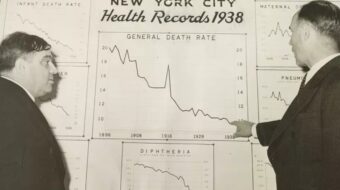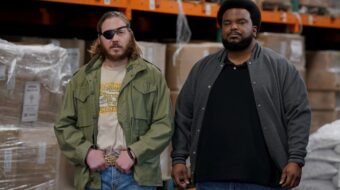
Season seven, episode ten, “The Forecast”
While the first two episodes of this half season drew us backward – into an exploration of Don’s losses, into a focus on the relationships to which he can never return – this episode looks forward. It invites us to consider- – with Don and others–what might occur after our time with them is finished. What’s next? What’s “the forecast” for their lives?
In the guise of preparing the “Gettysburg Address” speech on SCP for a McCann retreat that Roger will attend, Don wanders from colleague to colleague to suss out ideas on where the company is headed. But, it’s soon clear that this is merely cover for his quest for a direction to and the meaning of his own life. His apartment “reeks with failure,” according to his realtor, and while he protests that “a lot of wonderful things happened here,” we know–and I expect he does too–that that’s untrue. So, as President Lincoln sought to make meaning out of the deaths of tens of thousands of people on the fields of Gettysburg, Don Draper (on a much smaller scale) takes Roger’s inflated metaphor for his talk and tries to engage others in discussions on the meaning of life. When Ted responds to Don that he hopes for perhaps a tire account, or bigger yet, a pharmaceutical company, “That’s your dream?” Don wonders. “Bigger accounts?”
He pulls Peggy closer to where he wants to go, using her performance review to get her finally to say that she wants to create “something of lasting value.” “In advertising?” he laughs. She just gets aggravated with him, though, retorting, “This is supposed to be about my job, not the meaning of life.” When he responds, “So you think those things are unrelated?” we can glimpse what he wants, but she storms out of his office, thinking he’s being critical of her aspirations, but I see him as trying to figure out his own.
When he’s musing on the speech into his tape recorder, he says, “Four score and seven years ago. We know where we’ve been and where we are. Let’s assume that it’s good. But it’s gonna get better. It’s supposed to get better.” How can Don Draper–who’s so seriously mucked up his life and relationships–create something of lasting value that will make his life get better? For all of his faults, he does have a sense of how it should go. Though he should never have told Mathis the story about his comment to Lee Garner, Jr. – and Mathis shouldn’t have been dumb enough to re-use it–Don does tell the younger man the truth when he says that he needs to fix his own mistakes and deal with his own problems. Is that what Don is finally – or again – trying to do? Mathis tells Don that he has no character; “you’re just handsome.” That’s often true, but Don strikes me as giving it a sober effort in this episode.
He also has not been a good father in so many ways, but is right when he tells Sally that she is like him and Betty. For better and worse, we all are created out of the forge of our families, our childhood highs and traumas, our cultures, our time periods. Don knows that he is like his parents in many ways, that killing off Dick Whitman and adopting a new identity did not shed him of the dead young prostitute mother, the cruel father, the fundamentalist stepmother, the whore-house setting, or the grinding poverty. But, his advice to his angry daughter–who dreams “to get on a bus, get away from you and Mom, and hopefully be a different person than you two”– offers a kind of hope, both to her and to him: “You may not want to listen to this, but you ARE like your mother and me. You’re gonna find that out. You’re a very beautiful girl. It’s up to you to be more than that.” And, it’s up to Don to be more than just the handsome, but characterless, man Mathis accuses him of being. When he stands outside his sold apartment door, is he on the threshold of something new? Or will he again step back into the old? Or find some balance between the two?
–And–more briefly: is Joan also poised on the cusp of something new with the new Roger? It all moved very quickly, but there’s not a lot of time left in the show. Will she have really found love before it’s all over?
–And Glen Bishop. Yikes! I wasn’t expecting him to be the means of bringing the later part of the war home, and don’t know why we needed to have this minor character make an appearance in the show’s wrapping-up stage, but, since Weiner apparently feels his reappearance is necessary, I’ll try to make some sense of it beyond just saying “Eeew, creepy! Leave Betty alone!”
While I get a kid having a crush on an attractive adult neighbor (I had one of those when I was young too), Glen’s means of expressing it has always creeped me out. Betty handled it better this time than when he cut some of her hair off as a souvenir when he was little, but did he really expect her to give herself to him as his going-off-to-war present? Not believable. So, I’m going to assume something beyond a literal interpretation is suggested by the whole scene. Does Betty have some sort of mystical meaning to Glen? Is she the beautiful Helen over whom war becomes worth being fought? Or a courtly love figure? The beautiful married woman sung of from afar by the medieval bard? But, what happens when the warrior actually talks to his idol on the pedestal? When she doesn’t accept that role, the facade of the noble warrior starts to fall away: “But you understand why I’m doing it,” he wants to believe, but instead Betty–one of the few characters left who does support the war–says, “Do you want me to say that I like it?” “I know you do,” he presses on, “because I’m brave and I want to protect this country and everyone in it.” Yet he and Betty both know that’s a slogan. When she looks skeptical, he confesses that he’s really going because he flunked out of college. His myth of the beautiful woman to fight for “was going to be the good thing that came out of it.” He leaves on another lie–or at least a promise that cannot be kept–when Betty tells him, “You’re going to make it. I’m positive.” It’s a kindness to send him off with, but her actions later with Bobby’s toy gun show that she is now disturbed by and questioning the enterprise. It’s an odd way to get at the way Vietnam was still a force in American life in late 1970, but it’s either that or just “Eeew, Glen, stop.”
Either way, the episode ends with questions about what’s next for a number of the characters. And only a few more episodes to suggest where they might be headed.
This article is from Mad About Mad Men blog.












Comments